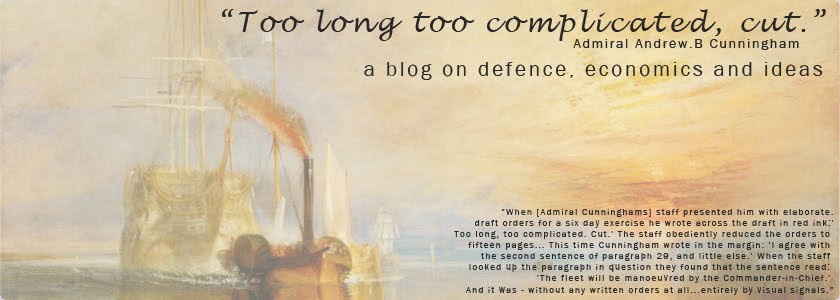"When [Admiral Cunninghams] staff presented him with elaborate...draft orders for a six day exercise he wrote across the draft in red ink: 'Too long, too complicated. Cut.' The staff obediently reduced the orders to fifteen pages... This time Cunningham wrote in the margin: 'I agree with the second sentence of paragraph 29, and little else.' When the staff looked up the paragraph in question they found that the sentence read: 'The fleet will be manoeuvred by the Commander-in-Chief.' And it was - without any written orders at all...entirely by visual signals.When I first read this it struck a chord and has stayed with me since then. Life is complicated and long winded and exasperating - how refreshing to cut through the 'verbiage' once in awhile. John Rentoul runs a 'banned list' in his Independent column that rails against needless language. His latest addition to the list
A story on Monday about the architect Le Corbusier included this: “But now the level of demand for such works means that even the most mundane items…are fetching thousands of pounds.” “The level of” is one of those terms ending in “of” that amount to little more than preliminary throat-clearing. They can nearly always be struck out. Other examples are “a sense of”, “a series of”, “the introduction of”, “a package of”, “a basket of”, “a raft of”, “a range of” and “the prospect of”.When writing a story, or a blog post!, it is easy to write as we talk. We naturally include 'umms', 'ahhs' and pauses in our speech. Sometimes it is to give us time to think and occasionally we insert them when not needed because to talk too fast is to seem hasty and ill considered. When translated to paper these pauses and 'umms' become the kind of needless 'verbiage' described above.
Churchill held that it was harder to write a short speech than a long one (although I cannot find a source for this particular piece of knowledge that resides in my head) and I have always had similar thoughts on writing. This blog post was twice as long before I started revising it...

